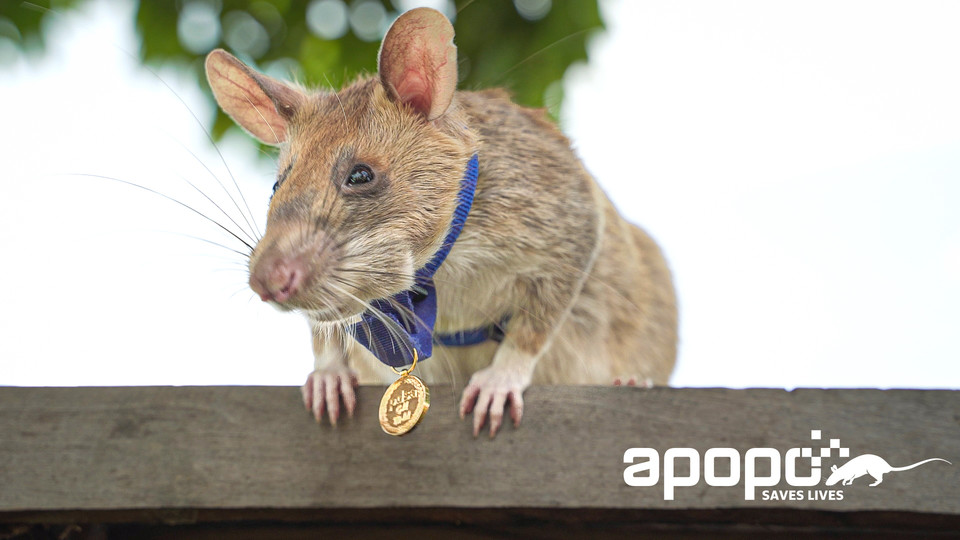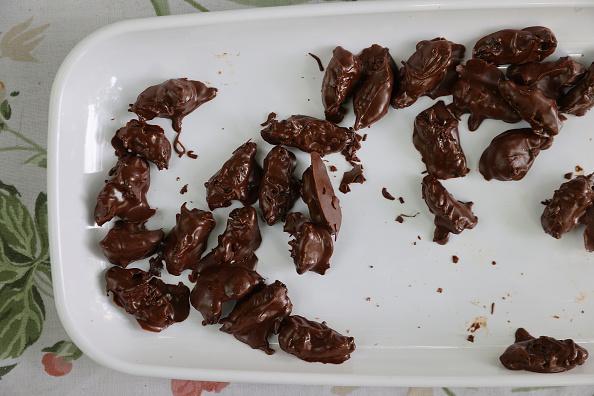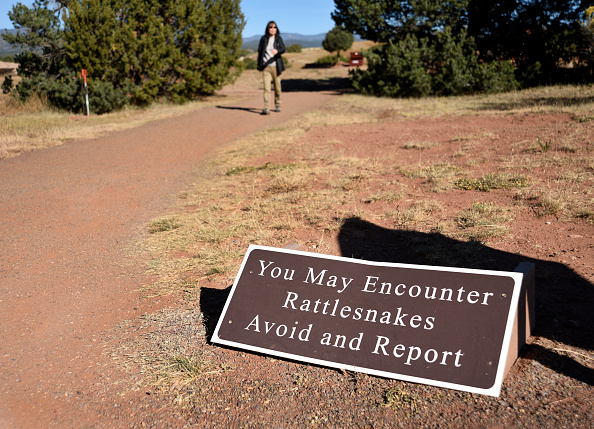Amid a global pandemic, deadly attacks, political crises and other bleak news, light-hearted stories are as necessary as ever. Here is a pick of the week's best funny, silly and quirky news from around the world.
HeroRAT calls it quits

HeroRAT Magawa with his PDSA Gold Medal. /PDSA via APOPO
HeroRAT Magawa with his PDSA Gold Medal. /PDSA via APOPO
If you've ever wondered what the retirement age is for a rat, the answer is five.
Magawa, an African giant pouched rat celebrated for his long career detecting landmines in Cambodia, is due to get a well-deserved break at long last.
During his years of service, "HeroRAT Magawa" cleared over 225,000 square meters of land, according to APOPO, a Belgian NGO that trains rodents to clear minefields in former conflict zones.
Magawa's impressive record also includes sniffing out 71 landmines and 38 items of unexploded ordnance.
This selfless work saw Magawa earn a Gold Medal "for animal gallantry or devotion to duty" from the UK veterinary charity PDSA last year, the first rat to receive such an honor.
African giant pouched rats, which come from Tanzania, have a strong sense of smell but are too light to set off landmines, making them especially effective in detecting buried explosive devices, according to APOPO.
"Magawa's performance has been unbeaten, and I have been proud to work side-by-side with him. He is small but he has helped save many lives," his handler Malen said in an APOPO statement.
"But he is slowing down, and we need to respect his needs. I will miss working with him!" she said.
Magawa will be able to live out his remaining years in comfort, with playtime, regular exercise and some tasty treats like peanuts and bananas, according to media reports.
Would you take a bite?

Chocolate covered cicadas are available for tasting during Cicadafest at Dr Jim Duke's Green Farmacy Garden on May 22, 2021 in Fulton, Maryland. /Getty
Chocolate covered cicadas are available for tasting during Cicadafest at Dr Jim Duke's Green Farmacy Garden on May 22, 2021 in Fulton, Maryland. /Getty
A plague of cicadas has swept down on the eastern U.S., causing car crashes, grounding planes and generally proving a nuisance to locals. But when life gives you lemons, make lemonade – or in the case of one chocolate shop, when life gives you giant bugs, turn them into chocolatey treats.
Employees at Chouquette Chocolates in Bethesda, Maryland, have been collecting cicadas – which have emerged en masse after 17 years underground – and coating them in chocolate. And the snacks have been literally flying off the shelf, according to owner Sarah Dwyer: the shop apparently has a 10-day backlog on orders.
"When you combine the chocolate, the cinnamon, and the nuttiness of the bugs, it really gives you that holiday feeling of when you're walking around a big city and they're roasting nuts on the sidewalk," she told Reuters.
The bugs are first frozen, then boiled and run through an air fryer to make them crispy.
More than a treat, they are full of protein, says Dwyer.
Those with food allergies however beware: the U.S. Food and Drug Administration put out a warning earlier this month telling people: "Don't eat #cicadas if you're allergic to seafood as these insects share a family relation to shrimp and lobsters."
Not something people would usually think of when biting into a piece of chocolate…
Load up the beer!

Crates of beer from several breweries in Bavaria, Germany, May 25, 2009. /Getty
Crates of beer from several breweries in Bavaria, Germany, May 25, 2009. /Getty
Germany's military has been faced with an unusual logistical problem while planning the withdrawal of troops from Afghanistan: what to do with hundreds of cases of beer, wine and prosecco.
The German commander recently imposed an alcohol ban on his 1,100 troops, citing the current security situation in Afghanistan. Previously, German soldiers stationed in the country as part of the NATO mission there were allowed two beers per day, according to the news magazine Spiegel.
This has left the German contingent with a surplus of undrunk booze. For legal and religious reasons, it can't be sold locally or given to the Afghan army, so the German army is now stuck with having to ship all these cases back home.
Twenty-nine pallets have already been loaded with 65,000 cans of beer and shandy as well as a few hundred bottles of wine and prosecco, ready to be put on a cargo plane for the journey back to Germany, Spiegel reported.
The sale of the booze upon arrival is expected to pay for the trip back.
Stomp and whack

A tourist approaches a sign in Pecos National Historical Park warning of the presence of rattlesnakes, Pecos, New Mexico, October 16, 2020. /Getty
A tourist approaches a sign in Pecos National Historical Park warning of the presence of rattlesnakes, Pecos, New Mexico, October 16, 2020. /Getty
Engineers for Australian airline Qantas have had to incorporate new procedures into their daily checks of A380s parked in California's Mojave desert: stomping their feet and whacking the planes' wheels.
No, this is not part of some obscure ritual, nor does it have any mechanical purpose, it is simply the most effective way of getting rid of a new problem they have encountered since the fleet was grounded due to COVID-19: rattlesnakes.
With commercial travel at a near complete halt due to the pandemic, Qantas' jets have been parked for months in the Mojave desert.
And the "feisty 'rattlers'… love to curl up around the warm rubber tyres and in the aircraft wheels and brakes," Qantas said in a statement on its website.
As a result, the engineers have developed a cutting-edge tool.
"Every aircraft has its own designated 'wheel whacker' (a repurposed broom handle) as part of the engineering kit, complete with each aircraft's registration written on it," said Qantas manager for engineering in Los Angeles, Tim Heywood.
"The first thing we do before we unwrap and start any ground inspections of the landing gear… is to walk around the aircraft stomping our feet and tapping the wheels with a wheel whacker to wake up and scare off the snakes."
Only then do they begin closer inspection.
The procedure is for the safety of the humans and the snakes, Qantas insisted. Any rattlesnake that chooses to stay hidden may find itself taking an unintended trip in the landing gear once the planes take off again.
Read more:
ICYMI: The week's quirky news from around the world – May 21, 2021
ICYMI: The week's quirky news from around the world – May 14, 2021

